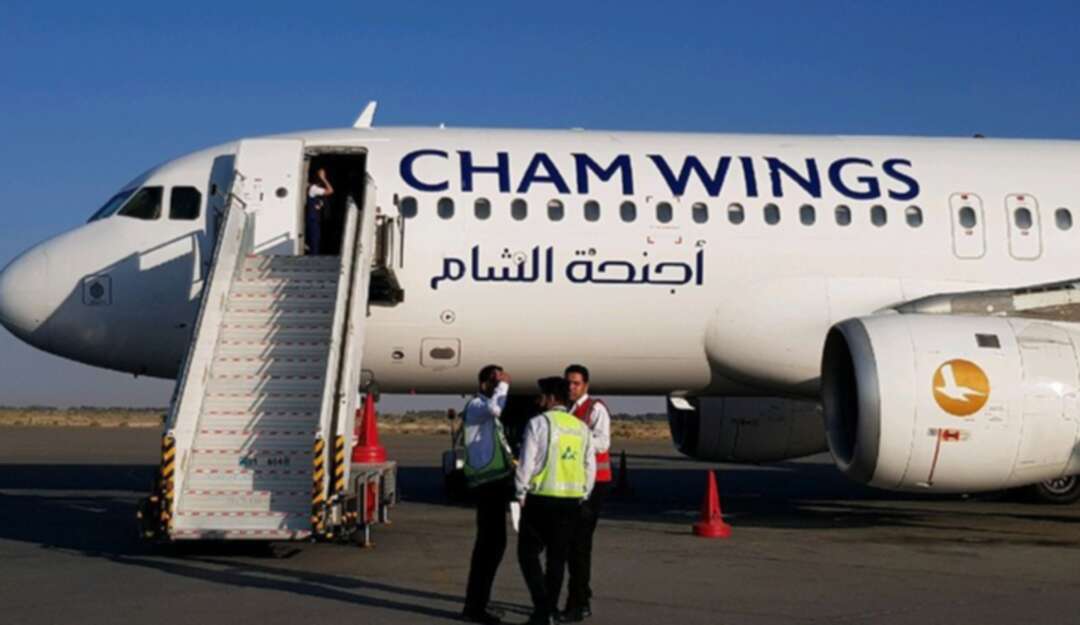-
"Wings of Al-Sham" and Secret Normalization Door.. Turkey Opens Its Airspace to Syrian Aviation
-
Allowing flights by a U.S.-sanctioned airline company to Turkey reveals a dramatic shift in Ankara's position, which previously supported armed groups against Damascus

Syrian media sources revealed that "Wings of Al-Sham" airline, which is on U.S. sanctions lists, plans to launch an air route connecting Aleppo airport with Istanbul and Cairo via Kuwait.
The official Syrian News Agency (SANA) reported Wednesday that the Syrian regime-affiliated company will begin operating weekly flights every Thursday from Aleppo airport to both Turkish and Egyptian destinations via Kuwait, starting November 14.
The sudden announcement raised questions about its timing, especially as some digital platforms circulated information about direct flights between Aleppo and Istanbul, while normalization efforts between Ankara and Damascus are experiencing notable setbacks.
A tourism company in Aleppo explained that the flights will be "transit" through Kuwait International Airport, where Syrian aircraft will stop for five hours before passengers continue their journey on Kuwait's Jazeera Airways aircraft.
A source at the tourism company revealed that Kuwait's Jazeera Airways signed an agreement with "Wings of Al-Sham" to transport their passengers to destinations that Syrian aircraft cannot reach due to sanctions and political restrictions.
Ticket prices from Aleppo or Damascus to Istanbul via Kuwait range between 4.5 and 5 million Syrian pounds, with options to land at Istanbul and Sabiha airports, while return flights are limited to Damascus airport only.
"Wings of Al-Sham" had previously announced mid-last month the launch of flights from Damascus to Istanbul and Cairo via Kuwait, as an alternative to the Beirut route which was suspended due to Israeli bombing damage to the Masnaa crossing.
The company operates two travel systems: either directly from Damascus to Beirut by air and then to the intended destination, or by land to Beirut via its buses then by air to the final destination.
This development comes amid the interruption of the land route between Syria and Lebanon since Israel targeted the vicinity of the Masnaa crossing in early October, which prompted "Wings of Al-Sham" to shift transit flights from Beirut to Kuwait.
The company is classified as Syria's second national carrier, owned by "Shamuot Trading Group," and suspended operations in 2012 due to sanctions before resuming activities in 2014.
The U.S. Treasury Department imposed sanctions on "Wings of Al-Sham" in late 2016, accusing it of providing financial, technical, and logistical support to the Syrian regime and the government airline.
This gradual aerial rapprochement between Damascus and Ankara reflects a dramatic shift in Turkish policy, which played a pivotal role in fueling the Syrian conflict since 2011.
In its normalization efforts with the Syrian regime, Ankara ignored its direct responsibility for the flow of tens of thousands of foreign fighters into Syria through its territory, which contributed to transforming peaceful protests into an armed conflict.
Political analysts view Turkey's reconciliation attempts with Damascus as coming at the expense of the Syrian opposition, which Ankara previously supported and transformed into mercenary forces serving its interests in Libya, Nagorno-Karabakh, and Africa.
Turkey ignores in its negotiations with the Syrian regime the fate of about 4 million Syrian refugees on its territory, who fled from the oppression of the regime that Ankara now seeks to reconcile with, in stark contradiction to its previous positions.
These shifts in Turkish policy raise serious concerns about the fate of Syrian armed factions that Ankara trained and armed, which are likely to find themselves new victims of the region's volatile political interests.
Levant-Follow up
You May Also Like
Popular Posts
Caricature
BENEFIT AGM approves 10%...
- March 27, 2025
BENEFIT, the Kingdom’s innovator and leading company in Fintech and electronic financial transactions service, held its Annual General Meeting (AGM) at the company’s headquarters in the Seef District.
During the meeting, shareholders approved all items listed on the agenda, including the ratification of the minutes of the previous AGM held on 26 March 2024. The session reviewed and approved the Board’s Annual Report on the company’s activities and financial performance for the fiscal year ended 31 December 2024, and the shareholders expressed their satisfaction with the company’s operational and financial results during the reporting period.
The meeting also reviewed the Independent External Auditor’s Report on the company’s consolidated financial statements for the year ended 31 December 2024. Subsequently, the shareholders approved the audited financial statements for the fiscal year. Based on the Board’s recommendation, the shareholders approved the distribution of a cash dividend equivalent to 10% of the paid-up share capital.
Furthermore, the shareholders endorsed the allocation of a total amount of BD 172,500 as remuneration to the members of the Board for the year ended 31 December 2024, subject to prior clearance by related authorities.
The extension of the current composition of the Board was approved, which includes ten members and one CBB observer, for a further six-month term, expiring in September 2025, pending no objection from the CBB.
The meeting reviewed and approved the Corporate Governance Report for 2024, which affirmed the company’s full compliance with the corporate governance directives issued by the CBB and other applicable regulatory frameworks. The AGM absolved the Board Members of liability for any of their actions during the year ending on 31st December 2024, in accordance with the Commercial Companies Law.
In alignment with regulatory requirements, the session approved the reappointment of Ernst & Young (EY) as the company’s External Auditors for the fiscal year 2025, covering both the parent company and its subsidiaries—Sinnad and Bahrain FinTech Bay. The Board was authorised to determine the external auditors’ professional fees, subject to approval from the CBB, and the meeting concluded with a discussion of any additional issues as per Article (207) of the Commercial Companies Law.
Speaking on the company’s performance, Mr. Mohamed Al Bastaki, Chairman BENEFIT , stated: “In terms of the financial results for 2024, I am pleased to say that the year gone by has also been proved to be a success in delivering tangible results. Growth rate for 2024 was 19 per cent. Revenue for the year was BD 17 M (US$ 45.3 Million) and net profit was 2 Million ($ 5.3 Million).
Mr. Al Bastaki also announced that the Board had formally adopted a new three-year strategic roadmap to commence in 2025. The strategy encompasses a phased international expansion, optimisation of internal operations, enhanced revenue diversification, long-term sustainability initiatives, and the advancement of innovation and digital transformation initiatives across all service lines.
“I extend my sincere appreciation to the CBB for its continued support of BENEFIT and its pivotal role in fostering a stable and progressive regulatory environment for the Kingdom’s banking and financial sector—an environment that has significantly reinforced Bahrain’s standing as a leading financial hub in the region,” said Mr. Al Bastaki. “I would also like to thank our partner banks and valued customers for their trust, and our shareholders for their ongoing encouragement. The achievements of 2024 set a strong precedent, and I am confident they will serve as a foundation for yet another successful and impactful year ahead.”
Chief Executive of BENEFIT; Mr. Abdulwahed AlJanahi commented, “The year 2024 represented another pivotal chapter in BENEFIT ’s evolution. We achieved substantial progress in advancing our digital strategy across multiple sectors, while reinforcing our long-term commitment to the development of Bahrain’s financial services and payments landscape. Throughout the year, we remained firmly aligned with our objective of delivering measurable value to our shareholders, strategic partners, and customers. At the same time, we continued to play an active role in enabling Bahrain’s digital economy by introducing innovative solutions and service enhancements that directly address market needs and future opportunities.”
Mr. AlJanahi affirmed that BENEFIT has successfully developed a robust and well-integrated payment network that connects individuals and businesses across Bahrain, accelerating the adoption of emerging technologies in the banking and financial services sector and reinforcing Bahrain’s position as a growing fintech hub, and added, “Our achievements of the past year reflect a long-term vision to establish a resilient electronic payment infrastructure that supports the Kingdom’s digital economy. Key developments in 2024 included the implementation of central authentication for open banking via BENEFIT Pay”
Mr. AlJanahi concluded by thanking the Board for its strategic direction, the company’s staff for their continued dedication, and the Central Bank of Bahrain, member banks, and shareholders for their valuable partnership and confidence in the company’s long-term vision.
opinion
Report
ads
Newsletter
Subscribe to our mailing list to get the new updates!






















